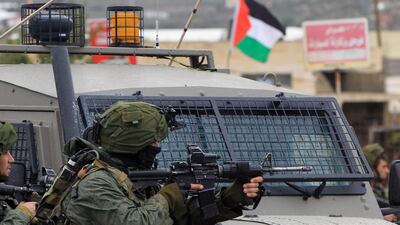Israel’s frantic cocoon-weaving entered a new phase last week, as Benjamin Netanyahu’s government stepped up efforts to stifle the last vestiges of dissent.
The military censor’s office, a draconian 70-year-old hangover from British rule in Palestine, extended its powers over Israeli press and TV to prominent blogs and social media.
The government has also threatened to revoke the press cards of “journalists and editors who are negligent in their work” – aimed at those who depart too obviously from the official line.
These moves follow culture minister Miri Regev’s announcement of a “loyalty law” that will deny state funding to artists and cultural institutions that are not sufficiently patriotic.
The education minister, settler leader Naftali Bennett, meanwhile, is reportedly preparing a raft of measures: a ban on access for pupils to literature and theatre not in line with government thinking, cuts to already very limited pluralism education and a new civics textbook vilifying the Palestinian minority.
In this atmosphere of inculcated ignorance and prejudice, it is easy for Mr Netanyahu to persuade public opinion that the recent wave of Palestinian protests and attacks, which have left more than 160 Palestinians and 29 Israelis dead, is solely the result of “incitement” from Palestinian officials and media. The Israeli right suggests that Palestinians who stab or drive cars at their oppressors, most often soldiers and settlers, are easily inflamed into action by words that appeal to ancient prejudice.
As the Israeli public discourse grows ever more detached from reality, Israel’s military commanders sound like an oasis of sanity – at least, by comparison.
The Israeli army actually has an operational interest in understanding what drives the Palestinian attacks – both to better counter them and to quieten growing government pressure for drastic responses, ones that could trigger the collapse of Mahmoud Abbas’s Palestinian Authority.
The military have sent intelligence officials into Israeli prisons to interview Palestinians who were not killed during their attacks, including children as young as 13.
What the army has found should surprise no one. Palestinians feel desperate and hopeless about a situation in which their own and their families’ freedoms are tightly restricted by a seemingly endless Israeli occupation.
The Palestinians behind the attacks – “lone wolves”, as Israelis call them – are often also facing extreme personal crises: suicidal thoughts, financial troubles or grief from a relative or friend’s death at Israel’s hands.
Few have had any experience of Israelis beyond the soldiers who mistreat them at checkpoints and during raids on their villages, and the settlers who lord it over them.
These findings have provoked a widening rift between the government and military.
Mr Netanyahu and his allies, drawing on the Israeli right’s traditional “iron wall” philosophy of ruthlessly crushing Palestinian dissent, have demanded greater privations for those under occupation to make them submit.
Last week, the government responded to an attack on a checkpoint by a Palestinian security official that injured three Israeli soldiers by locking down Ramallah, the Palestinians’ current economic and political capital.
The army effectively overruled that decision the next day. Gadi Eisenkott, the chief of general staff, has repeatedly warned that collective punishment will only fuel Palestinian anger and increase attacks.
He argues that more permits for Palestinian labourers to work in Israel, improving the Palestinian economy, is “an Israeli interest and a restraining factor”. He also prefers nurturing existing ties with the Palestinian security forces.
The military doves, however, are no less deluded than the political hawks.
The politicians want a collective stick to beat the Palestinians, one that will only intensify the conflict.
The military, on the other hand, want individual perks for good behaviour to perpetuate the status quo a little longer.
What neither side wishes to talk about is the framework that creates Palestinian despair and anger: the occupation.
The personal crises identified by the military that spur Palestinians to violence – debt, depression and the killing of a friend or relative – are not a stroke of bad luck befalling individuals. They are an inevitable by-product of the systematic abuses inflicted on an entire occupied population.
Lawlessness from land-hungry Jewish settlers, severe movement restrictions, home demolitions and “policing” by a hostile army ensure Palestinians live as a subjugated people, slaves to ever harsher repression.
Anyone who challenges Israelis’ bubble of illusions faces the Israeli government’s wrath, as UN secretary-general Ban Ki-moon found last month. When he pointed out the obvious – that it was “human nature to react to occupation” – Mr Netanyahu accused him of “stoking terror”.
Worse vitriol rained down on Sweden’s foreign minister, Margot Wallstrom, when she made much the same point – and urged an investigation into the apparent executions of some of the Palestinians recently killed by the army. She was accused of “defamation” and officially barred from visiting Israel.
The blinkered assumptions of both Israel’s politicians and its generals mean neither can find a way out of the current mire.
Those who wish simply to perpetuate Palestinian suffering may triumph over those who would prefer to intensify it. Either way, Palestinians will continue resisting.
Jonathan Cook is an independent journalist in Nazareth


